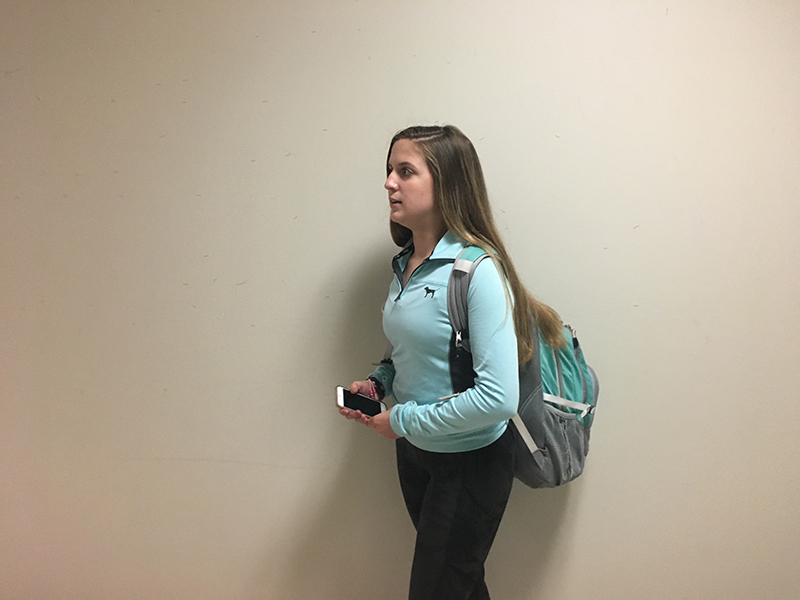With finals week upon us, textbooks, laptops and binders are just a few of the heavy items that spill out of backpacks as students stuff their bags to the brim. Despite the practicality of backpacks, they may endanger the health and safety of students.
“Since at least 1998, we’ve noticed backpacks getting bigger and heavier, and not in proportion to the kids’ sizes,” Dr. Karen Jacobs, a clinical professor at Boston University and spokesperson for the American Occupational Therapy Association, said to TIME Magazine. “Kids are saying ‘My back hurts, my neck and my shoulders hurt.’ A heavy backpack can also contribute to headaches and problems concentrating at school.”
Walking through the halls, students lug around backpacks that weigh an average of 18.4 pounds according to Consumer Reports.
“I always carry about two or three binders, a couple of folders and my history textbook in my backpack. Along with those items, I have a waterbottle, pencil pouch, calculator and lunchbox that I also have to carry,” freshman Rabiah Hilaly said. “It’s frustrating because there’s nothing I can do to lessen the load since teachers make us carry around the same papers, and the weight of them adds up over time.”

Sophomore Gabby Leon carries three binders,
Folders, a water bottle and a history textbook around school on a daily basis.
According to the U.S. Consumer Product Safety Commission, at least 14,000 children are treated for backpack-related injuries every year, while another estimated 5,000 are sent to the emergency room due to this issue.
“I would say that I carry a good 20 to 30 pounds in my backpack every day,” sophomore Katharine Segrave said. “My lower back has always been a struggle because of my backpack weight, and it has resulted in me having to go to a massage therapist and other rehab facilities that align certain muscles that have become out of place because of the weight of my backpack.”
According to orthopedist David Marshall, for those who suffer from scoliosis, a stress fracture, muscle strain or other spine or back related issues, heavy backpacks can aggravate the condition or delay recovery, just like the condition Segrave suffers from.
“I attribute my shoulder pain to my backpack because it puts a lot of strain on my left shoulder, so that is why I have to tape my shoulder and go to physical therapy twice a week. I noticed that when I started middle school, my shoulder started getting really tense because of how much weight I was holding and over time it got worse,” Segrave said. “It became so bad that I have had to visit a doctor and a physical therapist, and it turns out that I have scoliosis. Over time, the ever-growing weight of my backpack contributed to this condition.”
However, students can prevent this issue by utilizing other methods to lessen the weight off of their shoulders.

Infographic on what qualities to look for in a backpack that will work best for your back.
“Lockers would be helpful to keep heavy items in, but my locker does not fit all of my books, even though I have one that is considered bigger,” freshman Jordan Russell said. “Luckily, my English teacher lets me keep my binder in her classroom so that I do not have to carry it around all day, and that is very helpful.”
There are also alternatives to the normal two-strap backpack, yet even rolling bags such as the one Russell uses pose other logistic issues.
“Since I do not have time to go to my locker, I have to carry all of my books in my backpack. When I use a two-strap backpack, my back hurts and the pain lasts all day, even when I get home,” Russell said. “I tried using a rolling backpack, but it was very time consuming, as I had to leave classes early just so that I could use the elevator and get through the hallways. Rolling backpacks are on the floor, but a good quality one is pricey. I paid $157 for my first one and $70 for my second one, but the straps get jammed in the bag part, so I don’t roll it.”
To combat this issue, both Segrave and Russell believe reducing the amount of paper we carry would help.
“The biggest issue I see is teachers not utilizing technology to its fullest. Since technology is becoming more widely used in schools, we need to put homework and textbooks online for students so that they’re able to access it without the weight of textbooks. Having more electronic access at school such as tablets would also lessen the weight since the weight of paper would not exist,” Segrave said.
Segrave stresses a need for students to be conscious about the weight they carry day-to-day.
“Awareness would definitely help my peers understand that heavy backpacks actually endanger your health,” Segrave said. “Even though it may just require small adjustments to lessen the weight you carry, the effects are huge.”




![Smiling in a sea of Longhorns, Fox 2 reporter Ty Hawkins joins junior Darren Young during the morning Oct. 3 pep rally. The last time West was featured in this segment was 2011. “[I hope people see this and think] if you come to [Parkway] West, you will have the time of your life because there are so many fun activities to do that make it feel like you belong here. I was surprised so many people attended, but it was a lot of fun,” Young said.](https://pwestpathfinder.com/wp-content/uploads/2025/10/Edited2-1200x798.jpg)
![West High seniors and families listen as a representative of The Scholarship Foundation of St. Louis, Teresa Steinkamp, leads a Free Application for Federal Student Aid (FAFSA) workshop. This session, held in the library, provided guidance on financial aid, scholarships and student loan options. “This event is very beneficial for any seniors who are applying to or considering applying to colleges after high school [because] the cost of college is on the rise for seniors and parents,” college and career counselor Chris Lorenz said.](https://pwestpathfinder.com/wp-content/uploads/2025/09/DSC_4478-1200x778.jpg)
![Senior Kamori Berry walks across the field during halftime at the Homecoming football game on Sept. 12. During the pep assembly earlier that day, she was pronounced Homecoming Queen. “I thought it was nice that the crowd [started] cheering right away. I know [my friends] were really excited for me, and my family was happy because typically non-white people don't win,” Berry said.](https://pwestpathfinder.com/wp-content/uploads/2025/09/DSC7046-Enhanced-NR-1200x798.jpg)



![Pitching the ball on Apr. 14, senior Henry Wild and his team play against Belleville East. Wild was named scholar athlete of the year by St. Louis Post-Dispatch after maintaining a high cumulative GPA and staying involved with athletics for all of high school. “It’s an amazing honor. I feel very blessed to have the opportunity to represent my school [and] what [it] stands for,” Wild said.](https://pwestpathfinder.com/wp-content/uploads/2025/05/unnamed-6-1200x714.jpg)
![The Glory of Missouri award recipients stand with their certificates after finding out which virtue they were chosen to represent. When discovering their virtues, some recipients were met with contented confirmation, while others, complete surprise. “I was not at all surprised to get Truth. I discussed that with some of the other people who were getting the awards as well, and that came up as something I might get. Being in journalism, [Fellowship of Christian Athletes and] Speech and Debate, there's a culture of really caring about truth as a principle that I've tried to contribute to as well. I was very glad; [Truth] was a great one to get,” senior Will Gonsior said.](https://pwestpathfinder.com/wp-content/uploads/2025/04/Group-Glory-of-Missouri.jpg)

![After a thrilling point, senior Katie Byergo and junior Elle Lanferseick high-five each other on Oct. 8. With teamwork and camaraderie, Byergo worked together in the game against Lafayette High School. “[Byergo’s] is really positive with a good spirit,” Lanferseick said. “I set her [the ball] and she hits it [or] gets the kill.”](https://pwestpathfinder.com/wp-content/uploads/2025/10/DSC_9349-1-e1761159125735-1200x791.jpg)
![Focused on providing exceptional service, sophomore Darsh Mahapatra carefully cleans the door of a customer’s car. Mahapatra has always believed his customers deserve nothing less than the best. “[If] they’re trusting us with their car and our service, then I am convinced that they deserve our 100 percent effort and beyond,” Mahapatra said.](https://pwestpathfinder.com/wp-content/uploads/2025/10/DSC_0018-1200x800.jpg)
![Sophomore Aleix Pi de Cabanyes Navarro (left) finishes up a soccer game while junior Ava Muench (right) warms up for cross country practice. The two came to Parkway West High School as exchange students for the 2025-2026 school year. “The goal for the [exchange] program is to provide opportunities for both Parkway students and our international exchange students to learn about other cultures, build connections and become confident, capable, curious and caring — Parkway’s Four C’s — in the process,” Exchange Program Lead Lauren Farrelly said.](https://pwestpathfinder.com/wp-content/uploads/2025/10/Feature-Photo-1200x800.png)
![Leaning on the podium, superintendent Melissa Schneider speaks to Parkway journalism students during a press conference. Schneider joined Parkway in July after working in the Thompson School District in Colorado. “My plan [to bond with students] is to get things on my calendar as much as possible. For example, being in [classes] is very special to me. I am trying to be opportunistic [meeting] kids [and] being in [the school] buildings. I have all the sports schedules and the fine arts schedules on my calendar, so that when I'm available, I can get to them,” Schneider said.](https://pwestpathfinder.com/wp-content/uploads/2025/09/IMG_5425-1200x943.jpeg)
![Gazing across the stage, sophomore Alexis Monteleone performs in the school theater. The Monteleone family’s band “Monte and the Machine” has been releasing music since 2012, but Alexis started her own solo career in 2024 with the release of her first single, Crying Skies. “My whole family is very musical, [and I especially] love writing [songs with them],” Monteleone said.](https://pwestpathfinder.com/wp-content/uploads/2025/09/DSC7463-1200x798.jpg)
![Leaping through the air, senior Tyler Watts celebrates his first goal of the season, which put the Longhorns up 1-0 against the Lafayette Lancers. Watts decided to play soccer for West for his last year of high school and secured a spot on the varsity roster. “[Playing soccer for West] is something I had always dreamed of, but hadn’t really had a good opportunity to do until now. It’s [really] fun being out [on the field], and I’m glad I decided to join the team. It’s just all about having fun with the boys and enjoying what time we have left together,” Watts said.](https://pwestpathfinder.com/wp-content/uploads/2025/09/DSC_1951-1200x855.jpg)

![Shifting global trade, President Donald Trump’s tariffs are raising concerns about economic stability for the U.S. and other countries alike. “[The tariffs are] going to pose a distinct challenge to the U.S. economy and a challenge to the global economy on the whole because it's going to greatly upset who trades with who and where resources and products are going to come from,” social studies teacher Melvin Trotier said.](https://pwestpathfinder.com/wp-content/uploads/2025/05/MDB_3456-1200x800.jpg)
![Red, white and blue, the American flag holds the values of our democracy. The fight that we once endured has returned, as student journalists and senior correspondents across the country are losing their voices due to government control. “[Are] the White House and [the] government limiting free speech [and] freedom of the press? Yes [they are],” chief communications officer of the Parkway School District and former journalist Elisa Tomich said.](https://pwestpathfinder.com/wp-content/uploads/2025/03/Untitled-design-14.jpg)
![Freezing in their position, the Addams Family cast hits the “rigor mortis” pose after cast member and senior Jack Mullen, in character as Gomez Addams, calls out the stiff death move. For the past four months, the combined company of cast members, orchestra pit, crew and directors all worked to create the familial chemistry of the show. “I’m excited for [the audience] to see the numbers, the music, the scenes, but I also just love all the technical aspects of it. The whole spectacle, the costumes, makeup and the people that put in the work backstage in order to make the show successful on stage. I’m excited for people to see and appreciate that,” Mullen said.](https://pwestpathfinder.com/wp-content/uploads/2025/03/DSC0116-1200x800.jpg)
